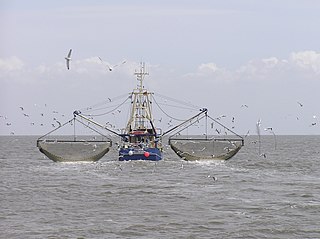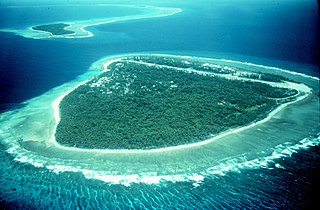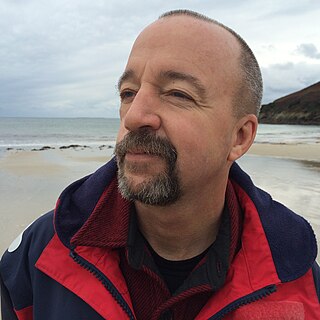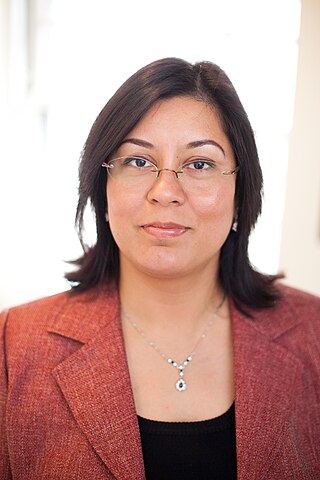Related Research Articles

Water pollution is the contamination of water bodies, with a negative impact on their uses. It is usually a result of human activities. Water bodies include lakes, rivers, oceans, aquifers, reservoirs and groundwater. Water pollution results when contaminants mix with these water bodies. Contaminants can come from one of four main sources. These are sewage discharges, industrial activities, agricultural activities, and urban runoff including stormwater. Water pollution may affect either surface water or groundwater. This form of pollution can lead to many problems. One is the degradation of aquatic ecosystems. Another is spreading water-borne diseases when people use polluted water for drinking or irrigation. Water pollution also reduces the ecosystem services such as drinking water provided by the water resource.

Hydrobiology is the science of life and life processes in water. Much of modern hydrobiology can be viewed as a sub-discipline of ecology but the sphere of hydrobiology includes taxonomy, economic and industrial biology, morphology, and physiology. The one distinguishing aspect is that all fields relate to aquatic organisms. Most work is related to limnology and can be divided into lotic system ecology and lentic system ecology.

Marine ecosystems are the largest of Earth's aquatic ecosystems and exist in waters that have a high salt content. These systems contrast with freshwater ecosystems, which have a lower salt content. Marine waters cover more than 70% of the surface of the Earth and account for more than 97% of Earth's water supply and 90% of habitable space on Earth. Seawater has an average salinity of 35 parts per thousand of water. Actual salinity varies among different marine ecosystems. Marine ecosystems can be divided into many zones depending upon water depth and shoreline features. The oceanic zone is the vast open part of the ocean where animals such as whales, sharks, and tuna live. The benthic zone consists of substrates below water where many invertebrates live. The intertidal zone is the area between high and low tides. Other near-shore (neritic) zones can include mudflats, seagrass meadows, mangroves, rocky intertidal systems, salt marshes, coral reefs, lagoons. In the deep water, hydrothermal vents may occur where chemosynthetic sulfur bacteria form the base of the food web.

Coastal engineering is a branch of civil engineering concerned with the specific demands posed by constructing at or near the coast, as well as the development of the coast itself.

A wild fishery is a natural body of water with a sizeable free-ranging fish or other aquatic animal population that can be harvested for its commercial value. Wild fisheries can be marine (saltwater) or lacustrine/riverine (freshwater), and rely heavily on the carrying capacity of the local aquatic ecosystem.

Human activities have substantial impact on coral reefs, contributing to their worldwide decline. Damaging activities encompass coral mining, pollution, overfishing, blast fishing, as well as the excavation of canals and access points to islands and bays. Additional threats comprise disease, destructive fishing practices, and the warming of oceans.[2] Furthermore, the ocean's function as a carbon dioxide sink, alterations in the atmosphere, ultraviolet light, ocean acidification, viral infections, the repercussions of dust storms transporting agents to distant reefs, pollutants, and algal blooms represent some of the factors exerting influence on coral reefs. Importantly, the jeopardy faced by coral reefs extends far beyond coastal regions. The ramifications of climate change, notably global warming, induce an elevation in ocean temperatures that triggers coral bleaching—a potentially lethal phenomenon for coral ecosystems.

Linwood Pendleton, a Franco-American environmental economist, is the Executive Director of the Ocean Knowledge Action Network and formerly the Senior Vice-President for Science at the Centre for the 4th Industrial Revolution. Previously, he was the World Wildlife Fund (WWF) Global Oceans Lead Scientist. Since October 2014, Pendleton has served as International Chair in Marine Ecosystem Services at the Laboratory of Excellence and European Institute for Marine Studies. He is also a senior fellow at Duke's Nicholas Institute for Environmental Policy Solutions (NIEPS) and Adjunct Associate Professor at the Duke University Marine Laboratory, part of NIEPS. He previously served as the Director of Ocean and Coastal Policy for the Nicholas Institute (2009-2013) and was the founder of the Marine Ecosystem Services Partnership. Pendleton was the Acting Chief Economist for the National Oceanic and Atmospheric Administration (NOAA) from 2011-2013.

The Stanford Woods Institute for the Environment serves as Stanford University's environmental studies hub for faculty. An interdisciplinary research lab, Woods encompasses senior fellows and affiliated faculty as well as researchers, postdoctoral scholars, and students collaborating on sustainability research. It supports research in seven areas: climate, ecosystem services and conservation biology, food security, freshwater, oceans, public health, and sustainable development. It provides seed funding for environmental research and supports seven research centers, programs and workshops. In September 2022, it became part of the Stanford Doerr School of Sustainability.
Nancy Nash Rabalais is an American marine ecologist. She researches dead zones in the marine environment and is an expert in eutrophication and nutrient pollution.

The contributions of women in climate change have received increasing attention in the early 21st century. Feedback from women and the issues faced by women have been described as "imperative" by the United Nations and "critical" by the Population Reference Bureau. A report by the World Health Organization concluded that incorporating gender-based analysis would "provide more effective climate change mitigation and adaptation."

Christine A. Shoemaker joined the Department of Industrial Systems Engineering & Management and the Department of Civil and Environmental Engineering as NUS Distinguished Professor on 31 August 2015. Prof Shoemaker obtained her Ph.D. in mathematics from the University of Southern California supervised by Richard Bellman in Dynamic Programming. Upon her graduation, she joined the School of Civil and Environmental Engineering and later the School of Operations Research and Information Engineering at Cornell University, Ithaca, NY, USA. She was promoted to full Professor in 1985. From 1985 to 1988, Professor Shoemaker was the Chair of the Department of Environmental Engineering at Cornell University. In 2002 Prof. Shoemaker was appointed the Joseph P. Ripley Professor of Engineering at Cornell University, USA. In 2015, Prof. Shoemaker became Distinguished Professor at National University of Singapore, in both Industrial Systems Engineering and Management Department and Civil and Environmental Engineering Department. While in Singapore she has worked with Singapore water agency to apply her global optimization algorithms to improve the selection of parameters for computationally expensive partial differential equation models for lake hydrodynamics and complex multi-species water quality elements. These results used her group's new parallel algorithms.

Kaveh Madani is a scientist, activist, and former Iranian politician. He previously served as the Deputy Head of Iran's Department of Environment. He also served as the Vice President of the United Nations Environmental Assembly Bureau from 2017 to 2018.
Heidi Nepf is an American engineer known for her research on fluid flows around aquatic vegetation.

Tessa Michelle Hill is an American marine geochemist and oceanographer. She is a professor at the University of California, Davis, and a resident professor at its Bodega Marine Laboratory. She is a Fellow of the California Academy of Sciences, and in 2016 was named a Leshner Public Engagement Fellow of the American Association for the Advancement of Science. In that year she also received the US Presidential Early Career Award for Scientists and Engineers (PECASE).
Burcin Becerik-Gerber is a Turkish American engineering educator and Professor in the Sonny Astani Department of Civil and Environmental Engineering at the University of Southern California. She is known for her work in human-building interaction, a new field she pioneered, which researches the design and use of technology that focuses on the interfaces between buildings and their users. She is the founding director of the Innovation in Integrated Informatics LAB and the director of USC’s Center for Intelligent Environments (CENTIENTS). She puts a specific focus on human-building communication to change both user behavior and building behavior through trust in automation. Her research puts a deliberate emphasis on people-centric artificial intelligence for the built environment, for example smart workstations to improve well-being in the workplace.
Adina Paytan is a research professor at the Institute of Marine Sciences at the University of California, Santa Cruz. known for research into biogeochemical cycling in the present and the past. She has over 270 scientific publications in journals such as Science, Nature, Proceedings of the National Academy of Sciences, and Geophysical Research Letters.
Holly Michael is an American hydrogeologist and Associate Professor of geology at the University of Delaware's College of Earth, Ocean, and Environment.
Lisa Alvarez-Cohen is the vice provost for academic planning, Fred and Claire Sauer Professor at the University of California, Berkeley. She was elected a member of the National Academy of Engineering in 2010 for the discovery and application of novel microorganisms and biochemical pathways for microbial degradation of environmental contaminants. She is also a Fellow of the American Society for Microbiology.

Human activities affect marine life and marine habitats through overfishing, habitat loss, the introduction of invasive species, ocean pollution, ocean acidification and ocean warming. These impact marine ecosystems and food webs and may result in consequences as yet unrecognised for the biodiversity and continuation of marine life forms.

Shaily Mahendra is an Indian-American civil and environmental engineer. She is an associate professor of civil and environmental engineering at the University of California, Los Angeles (UCLA).
References
- 1 2 Rice, William B. (2010). Water Scientists. Capstone. ISBN 9780756543075.
- 1 2 3 4 5 6 University, © Stanford; Stanford; California 94305 (2014-03-10). "Alexandria Boehm - Professor of Civil and Environmental Engineering". Welcome to Bio-X. Retrieved 2019-05-05.
{{cite web}}: CS1 maint: numeric names: authors list (link) - 1 2 University, © Stanford; Stanford; California 94305 (2023-11-02). "Alexandria Boehm's Profile | Stanford Profiles". Archived from the original on 2023-06-08.
{{cite web}}: CS1 maint: numeric names: authors list (link) - 1 2 3 University, © Stanford; Stanford; California 94305 (2016-06-09). "Alexandria Boehm: How we can help save the coastal marine ecosystem". Stanford School of Engineering. Retrieved 2019-05-11.
{{cite web}}: CS1 maint: numeric names: authors list (link) - 1 2 "eGFI – Student Blog » Engineer Spotlight: Alexandria Boehm" . Retrieved 2019-05-05.
- 1 2 3 4 "Alexandria Boehm | Stanford Center on Global Poverty and Development". globalpoverty.stanford.edu. Retrieved 2019-05-05.
- ↑ "Alexandria Boehm". www.naefrontiers.org. Retrieved 2019-05-05.
- ↑ "Home". www.naefrontiers.org. Retrieved 2019-05-11.
- 1 2 3 "The West Coast Ocean Acidification and Hypoxia Science Panel" (PDF).
- 1 2 3 4 "Five Eminent Civil Engineers Earn Walter L. Huber Civil Engineering Research Prizes | ASCE News" . Retrieved 2019-05-05.
- ↑ "NSF Award Search: Award#0641406 - CAREER: Beach Contributions of Pathogen Indicators and Pathogens to Coastal Waters". nsf.gov. Retrieved 2019-05-05.